五年级英语下册第二课课文解析
苏教译林版五年级下册 Unit 2重点内容及练习

苏教译林版五年级下册Unit 2重点内容及练习一、苏教译林版五下U21.单词farfrom离....远moon月亮street街,街道near在...附近city城市by....乘(汽车,火车等)onfoot公共汽车,巴士metro地铁taxi出租车,的士bike自行车plane飞机ship轮船train火车ride骑车show给....看young年幼的basket篮子2.短语:very much 非常far from 离...远come to school 来学校by bus乘公共汽车on foot 步行by metro 乘地铁by taxi 乘出租车in the park 在公园里go to school 去上学by bike 骑自行车3.惯用语:What about you你呢Why 为什么Really 真的吗二、Unit 2 知识点精析1.如何询问对方的居住地址[课文应用] Where do you live now 你现在住在哪里I live on Moon Street ,near City Library. 我住在城市图书馆附近的月亮街。
[句型结构]问句: Where do you live(+其他)答语: I/We live+其他。
[重点解析] 问句用于询问对方住在哪里,是一个由where开头的特殊疑问句。
where意为“在哪里”。
例:-Where do you live now你现在住在哪里-I live in Happy Town. 我住在幸福城。
2.如何询问他人的居住地址(1)问句: Where does+主语(第三人称单数)+live(+其他)答语: He/She lives+其他.例如:-Where does he live now他现在住在哪里-He lives in Shanghai. 他住在上海。
(2)问句: Where do+主语(第三人称复数)+live(+其他)答语:They live+其他。
外研版(三起)-英语-五年级下册--Module3 Unit 2教材同步讲解
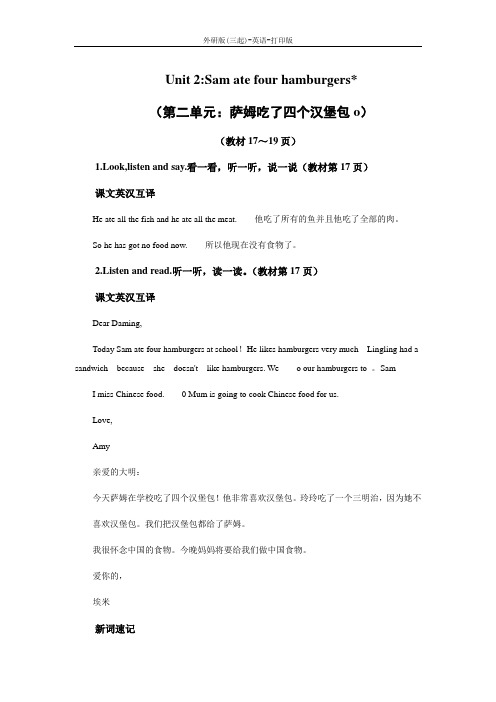
Unit 2:Sam ate four hamburgers*(第二单元:萨姆吃了四个汉堡包o)(教材17~19页)1.Look,listen and say.看一看,听一听,说一说(教材第17页)课文英汉互译He ate all the fish and he ate all the meat. 他吃了所有的鱼并且他吃了全部的肉。
So he has got no food now. 所以他现在没有食物了。
2.Listen and read.听一听,读一读。
(教材第17页)课文英汉互译Dear Daming,Today Sam ate four hamburgers at school!He likes hamburgers very much Lingling had a sandwich because she doesn't like hamburgers. We o our hamburgers to 。
SamI miss Chinese food. 0 Mum is going to cook Chinese food for us.Love,Amy亲爱的大明:今天萨姆在学校吃了四个汉堡包!他非常喜欢汉堡包。
玲玲吃了一个三明治,因为她不喜欢汉堡包。
我们把汉堡包都给了萨姆。
我很怀念中国的食物。
今晚妈妈将要给我们做中国食物。
爱你的,埃米新词速记gave/9eIv/v.(动词)给(give的过去式)短语:give…to’…挹……给……例句:I gave the old man five yuan yesterday.昨天我给了那个老人五元钱。
原形:glve1变为g .巧记:live____givetonight/ta' nart/adv.(副词)今晚,在今夜短语:today and tonight今天和今夜例句:We're going to go fishing tonight.我们打算在今晚去钓鱼。
PEP5小学英语五年级下册课文及翻译
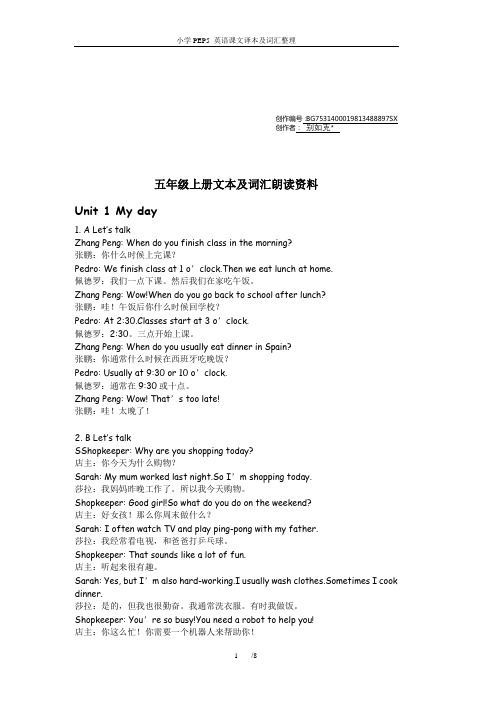
创作编号:BG7531400019813488897SX创作者:别如克*五年级上册文本及词汇朗读资料Unit 1 My day1. A Let’s talkZhang Peng: When do you finish class in the morning?张鹏:你什么时候上完课?Pedro: We finish class at 1 o’clock.Then we eat lunch at home.佩德罗:我们一点下课。
然后我们在家吃午饭。
Zhang Peng: Wow!When do you go back to school after lunch?张鹏:哇!午饭后你什么时候回学校?Pedro: At 2:30.Classes start at 3 o’clock.佩德罗:2:30。
三点开始上课。
Zhang Peng: When do you usually eat dinner in Spain?张鹏:你通常什么时候在西班牙吃晚饭?Pedro: Usually at 9:30 or 10 o’clock.佩德罗:通常在9:30或十点。
Zhang Peng: Wow! That’s too late!张鹏:哇!太晚了!2. B Let’s talkSShopkeeper: Why are you shopping today?店主:你今天为什么购物?Sarah: My mum worked last night.So I’m shopping today.莎拉:我妈妈昨晚工作了。
所以我今天购物。
Shopkeeper: Good girl!So what do you do on the weekend?店主:好女孩!那么你周末做什么?Sarah: I often watch TV and play ping-pong with my father.莎拉:我经常看电视,和爸爸打乒乓球。
Shopkeeper: That sounds like a lot of fun.店主:听起来很有趣。
Unit2Avisittothezoo课文原文及翻译闽教版英语五年级下册

闽教版小学英语五年级下册Unit2课文原文及翻译Unit 2 A Visit to the Zoo第二单元参观动物园Part AA部分1. Listen and follow.听录音并跟读。
Dad, I want to see elephants.爸爸,我想去看大象。
Where are they?它们在哪儿?Look, there is a map over there.看,那边有张地图。
Let' s go and have a look.我们过去看一看。
Go straight.直走。
Then turn right.然后右转。
There are some elephantsbehind the hill.小山后面就有一些大象。
Let's go.我们出发吧。
Wow. They're so tall and big.哇,它们又高又大啊。
Look, a baby elephant!看,一只象宝宝!It's lovely.它很可爱。
Let me take a photo of it.让我给它照张照片。
2. Look and say.看图说英语。
There is a map over there.那边有张地图。
There is a baby elephantin the zoo.动物园里有一只象宝宝。
There are some bears under the tree.树下面有一些熊。
There are some tigersnext to the lions.狮子旁边有一些老虎。
elephants tigers大象老虎bears monkeys熊猴子behind the hill 在山后面next to the lions 在狮子旁边under the tree 在树下beside the lake 在湖的旁边Where are the elephants? They are behind the hill.大象在哪里?它们在小山后面。
五年级下册英语第二课文翻译科普版
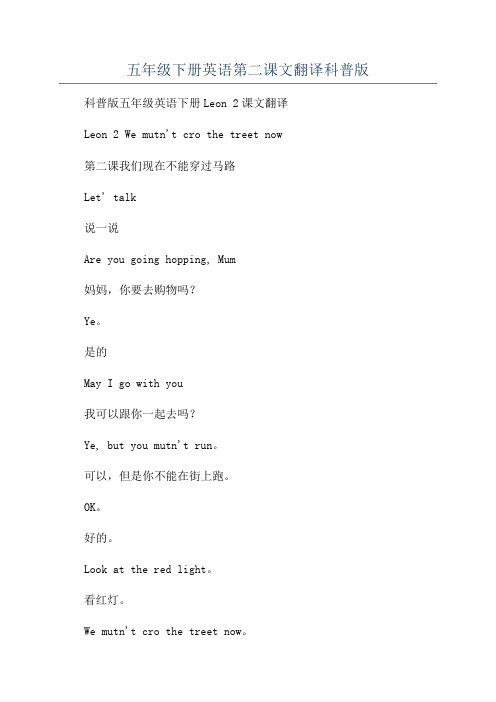
五年级下册英语第二课文翻译科普版科普版五年级英语下册Leon 2课文翻译Leon 2 We mutn't cro the treet now第二课我们现在不能穿过马路Let' talk说一说Are you going hopping, Mum妈妈,你要去购物吗?Ye。
是的May I go with you我可以跟你一起去吗?Ye, but you mutn't run。
可以,但是你不能在街上跑。
OK。
好的。
Look at the red light。
看红灯。
We mutn't cro the treet now。
我们现在不能穿过马路。
OK。
好的。
Now the light i green。
现在灯绿了。
We can cro the treet。
我们可以穿过马路了。
Ye。
是的。
Look at thee white line。
看看这些白线。
We mut cro the treet here。
我们必须从这里过马路。
Oh, I ee。
哦,我明白了。
Let' learn学一学You mutn't cro the treet here。
你不能从这里穿过马路。
You can cro the treet there。
你可以从那里过马路。
OK。
好的。
turn left向左转park the car停车turn around转身Let' chant说说唱唱Look to the left。
看左边。
Look to the right。
看右边。
There i a car in ight。
那儿有一辆车。
So we do what' right。
所以我们做正确的事情。
There' none on the left。
左边没有车。
There' none on the right。
右边没有车。
The way i clear。
路上很安全。
We can cro without fear。
五下Unit2_A_Let’s_talk-教案
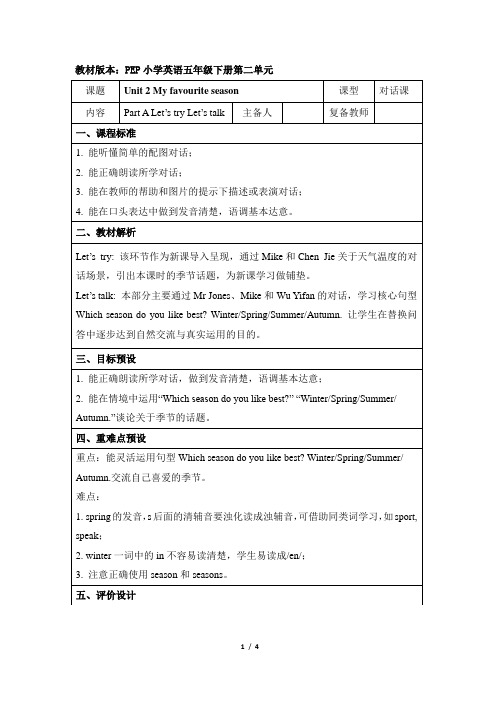
课题
Unit 2 My favourite season
课型
对话课
内容
Part A Let’s try Let’s talk
主备人
复备教师
一、课程标准
1.能听懂简单的配图对话;
2.能正确朗读所学对话;
3.能在教师的帮助和图片的提示下描述或表演对话;
4.能在口头表达中做到发音清楚,语调基本达意。
教师在课件上出示图片,学生快速认读,复习回顾天气描述词sunny, windy, snowy, rainy, cloudy。
呈现新课
(Presentation)
1. Let’s try
播放音频,回答问题What’s the weather like today? It’s …
Listen again,回答问题What’s Chen Jie’s favourite season?
三、目标预设
1.能正确朗读所学对话,做到发音清楚,语调基本达意;
2.能在情境中运用“Which season do you like best?” “Winter/Spring/Summer/
Autumn.”谈论关于季节的话题。
四、重难点预设
重点:能灵活运用句型Which season do you like best? Winter/Spring/Summer/
二、教材解析
Let’s try:该环节作为新课导入呈现,通过Mike和Chen Jie关于天气温度的对话场景,引出本课时的季节话题,为新课学习做铺垫。
Let’s talk:本部分主要通过Mr Jones、Mike和Wu Yifan的对话,学习核心句型Which season do you like best? Winter/Spring/Summer/Autumn.让学生在替换问答中逐步达到自然交流与真实运用的目的。
五年级英语下册第二课课文解析
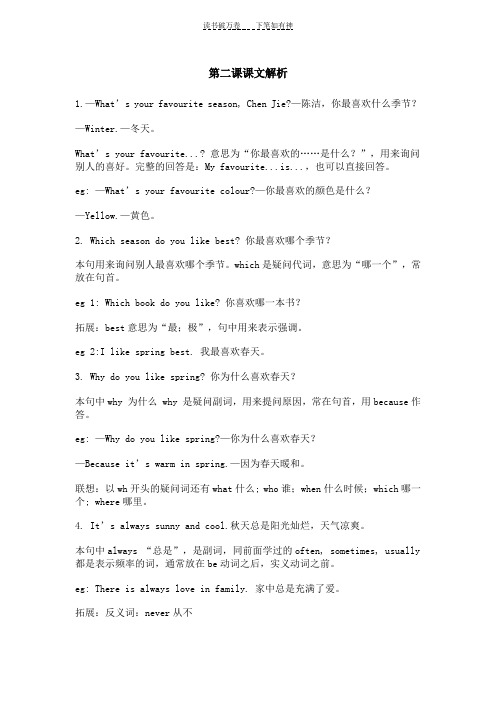
第二课课文解析1.—What’s your favourite season, Chen Jie?—陈洁,你最喜欢什么季节?—Winter.—冬天。
What’s your favourite...? 意思为“你最喜欢的……是什么?”,用来询问别人的喜好。
完整的回答是:My favourite...is...,也可以直接回答。
eg: —What’s your favourite colour?—你最喜欢的颜色是什么?—Yellow.—黄色。
2. Which season do you like best? 你最喜欢哪个季节?本句用来询问别人最喜欢哪个季节。
which是疑问代词,意思为“哪一个”,常放在句首。
eg 1: Which book do you like? 你喜欢哪一本书?拓展:best意思为“最;极”,句中用来表示强调。
eg 2:I like spring best. 我最喜欢春天。
3. Why do you like spring? 你为什么喜欢春天?本句中why为什么 why 是疑问副词,用来提问原因,常在句首,用because作答。
eg: —Why do you like spring?—你为什么喜欢春天?—Because it’s warm in spring.—因为春天暖和。
联想:以wh开头的疑问词还有what什么; who谁;when什么时候;which哪一个; where哪里。
4. It’s always sunny and cool.秋天总是阳光灿烂,天气凉爽。
本句中always “总是”,是副词,同前面学过的often, sometimes, usually 都是表示频率的词,通常放在be动词之后,实义动词之前。
eg: There is always love in family. 家中总是充满了爱。
拓展:反义词:never从不5. I can play with snow. 我可以玩雪。
小学英语_山东科学技术出版社五年级下册第四单元第二课教学设计学情分析教材分析课后反思
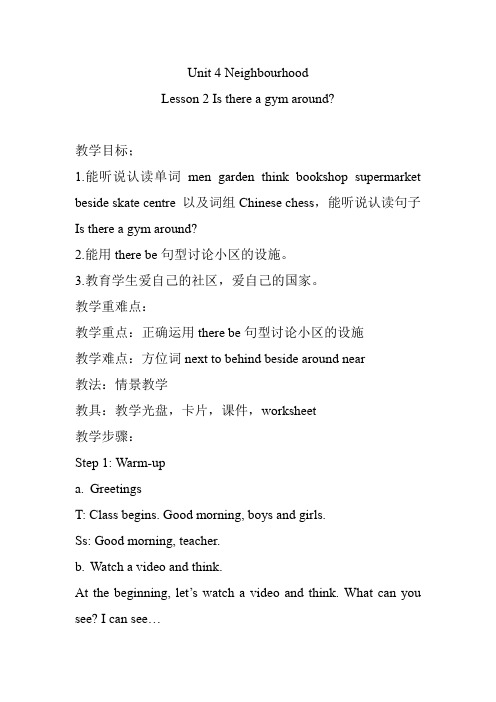
Unit 4 NeighbourhoodLesson 2 Is there a gym around?教学目标;1.能听说认读单词men garden think bookshop supermarket beside skate centre 以及词组Chinese chess,能听说认读句子Is there a gym around?2.能用there be句型讨论小区的设施。
3.教育学生爱自己的社区,爱自己的国家。
教学重难点:教学重点:正确运用there be句型讨论小区的设施教学难点:方位词next to behind beside around near教法:情景教学教具:教学光盘,卡片,课件,worksheet教学步骤:Step 1: Warm-upa.GreetingsT: Class begins. Good morning, boys and girls.Ss: Good morning, teacher.b.Watch a video and think.At the beginning, let’s watch a video and think. What can you see? I can see…Ss: I can see a school, gym, supermarket, bookshop,hospital, garden,sports centre, park.T:Good job! This video is about neighbourhood.(贴黑板上) [设计意图]通过视频图片,激活学生的知识储备,为接下来的学习做好铺垫。
C. ReviewT: You know Andy? Andy is from Ottawa. He lived in Young Street. He was Jenny’s neighbour. Now he is in China. He lives next to Li Ming. Andy is Li Ming’s new neighbour.[设计意图]通过图片呈现本课谈论的主题,整体呈现上节课课文,帮助学生从总体上理解课文,顺利导入本节学习。
- 1、下载文档前请自行甄别文档内容的完整性,平台不提供额外的编辑、内容补充、找答案等附加服务。
- 2、"仅部分预览"的文档,不可在线预览部分如存在完整性等问题,可反馈申请退款(可完整预览的文档不适用该条件!)。
- 3、如文档侵犯您的权益,请联系客服反馈,我们会尽快为您处理(人工客服工作时间:9:00-18:30)。
第二课课文解析
1.—What’s your favourite season, Chen Jie?—陈洁,你最喜欢什么季节?
—Winter.—冬天。
What’s your favourite...? 意思为“你最喜欢的……是什么?”,用来询问别人的喜好。
完整的回答是:My favourite...is...,也可以直接回答。
eg: —What’s your favourite colour?—你最喜欢的颜色是什么?
—Yellow.—黄色。
2. Which season do you like best? 你最喜欢哪个季节?
本句用来询问别人最喜欢哪个季节。
which是疑问代词,意思为“哪一个”,常放在句首。
eg 1: Which book do you like? 你喜欢哪一本书?
拓展:best意思为“最;极”,句中用来表示强调。
eg 2:I like spring best. 我最喜欢春天。
3. Why do you like spring? 你为什么喜欢春天?
本句中why为什么 why 是疑问副词,用来提问原因,常在句首,用because作答。
eg: —Why do you like spring?—你为什么喜欢春天?
—Because it’s warm in spring.—因为春天暖和。
联想:以wh开头的疑问词还有what什么; who谁;when什么时候;which哪一个; where哪里。
4. It’s always sunny and cool.秋天总是阳光灿烂,天气凉爽。
本句中always “总是”,是副词,同前面学过的often, sometimes, usually 都是表示频率的词,通常放在be动词之后,实义动词之前。
eg: There is always love in family. 家中总是充满了爱。
拓展:反义词:never从不
5. I can play with snow. 我可以玩雪。
本句中play with...玩……
eg: They like to play with snow. 他们喜欢在冬天玩雪。
拓展:play with snow玩雪
词汇学习
1. spring n.(春天)
eg: It is warm in spring.春天很暖和。
搭配:in spring在春天
联想:warm暖和的 windy有风的
2. summer n.(夏天)
eg: What’s the weather like in summer?夏天的天气怎么样?
搭配:summer holiday暑假
联想:hot炎热的
3. fall n.(秋天)
eg 1: Do you like fall?你喜欢秋天吗?
拓展:fall还可以作动词,意思为“落下,下降”。
eg 2: The leaves fall (落下) in fall (秋天).叶子在秋天凋落。
助记:fall=f+all(全,都)
4. winter n.(冬天)
eg: Winter is cold in Beijing.北京的冬天很寒冷。
搭配:winter holiday寒假 Winter Sports冬季运动会
联想:cold 寒冷的 snowy下雪的
5. season n.(季节)
eg: There are four seasons in a year.一年中有四季。
sea(大海)+son(儿子)+season(季节)
6. swim v.(游泳)
eg: —Can you swim?—你会游泳吗?
—Yes, I can.—是的,我会。
搭配:go swimming 去游泳 swimming pool游泳池
7. fly kites(放风筝)
eg 1: Let’s fly kites in the playground.让我们在操场上放风筝吧。
拓展:fly作动词,意思为“飞,放”。
eg 2: The birds fly in the sky.鸟儿在天空中飞。
注意:fly kites= fly a kite 都表示“放风筝”,注意分清短语中kite的单、复数形式。
8. skate v.(滑冰;滑冰鞋)
eg: You can skate in winter.你可以在冬天滑冰。
搭配:go skating 去滑冰
roller skates 四轮滑冰鞋 skateboard滑板
9. make a snowman n.(堆雪人)
eg: I like to make a snowman.我喜欢堆雪人。
联想:make the bed铺床 make friends交朋友
助记:snow(雪)+man(人)=snowman(雪人)
10. plant trees(种树)
eg 1: The students always plant trees in spring.学生们总是在春天种树。
拓展:这里plant作动词,意思为“种植”;还可以作名词,意思为“植物”。
eg 2: a tomato plant
11. leaf n.叶子
eg: The leaves turn yellow in fall. 秋天叶子变黄了。
拓展:复数形式:leaves
联想:green leaves绿叶
12. because conj.(因为)
eg: —Why do you like summer?—你为什么喜欢夏天?
—Because I can eat much ice-cream. —因为我可以吃冰淇淋。
拓展:because用来回答由why 引导的疑问句,常放在句子开头。
13. sleep v.(睡觉)
eg: They sleep in winter.它们冬眠。
搭配:go to sleep入睡,睡着
拓展:wake up醒来
语法学习
1. 询问原因的特殊疑问句及其应答。
我们常用疑问副词why来询问原因,并且放在句首。
回答这样的提问用because。
eg 1: —Why do you like winter?—你为什么喜欢冬天?
—Because I can sleep a long time.—因为我可以睡很长时间。
eg 2: —Why do you like summer?—你为什么喜欢夏天?
—Because I can swim in the lake.—因为我可以在湖里游泳。
另外,以wh开头的疑问词还有,what, who, when, which。
2. 询问别人的喜好以及回答。
我们一般常用Which is your favourite...?来询问别人的爱好。
回答时用:My favourite...is...,也可以直接回答。
eg: —Which is your favourite season? —你最喜欢哪个季节?
—My favourite season is spring. —我最喜欢春天。
